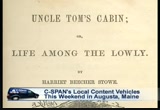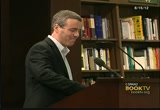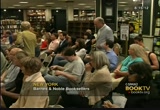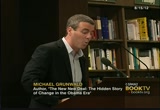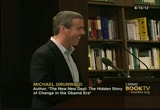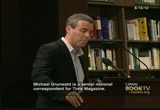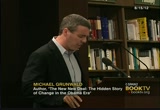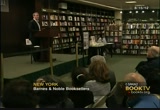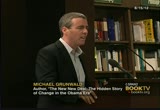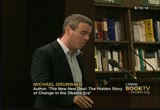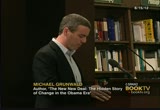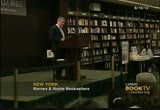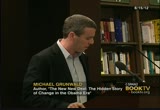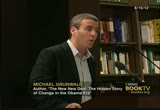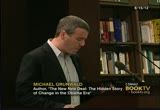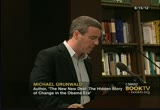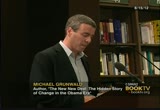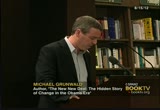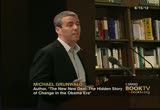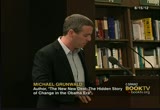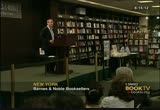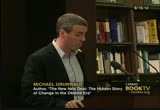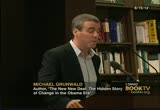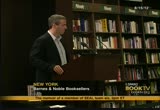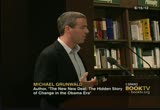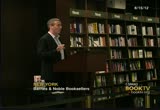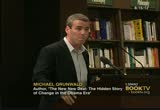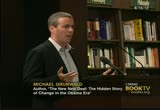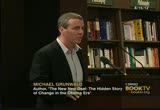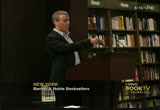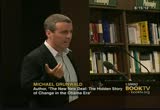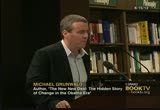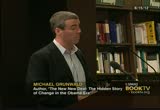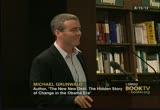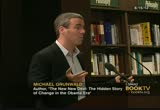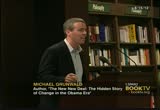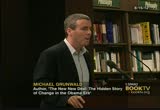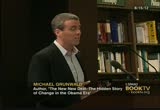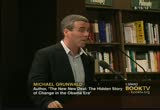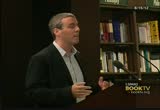tv Book TV CSPAN October 6, 2012 11:00am-12:00pm EDT
11:00 am
11:01 am
slave who finds him or herself in our borders. we have the right to do that. we are not a slave state. we can practice our laws as we see fit. >> more about harriet beecher stowe's this weekend as booktv, american history tv and c-span local content vehicles with behind-the-scenes at the history of literary life of augusta, maine and noon eastern on booktv on c-span2 and sunday at 5:00 p.m. on american history tv on c-span3. >> michael grunwald presents his thoughts on the $800 billion stimulus bill, the american recovery reinvestment act signed into law by president obama on february 17, 2009. this is about 50 minutes. [applause] >> thanks, all of you, for
11:02 am
coming and braving the rain. i am thrilled to start by 4 in new york. my wonderful parents are here. the only new yorkers who go to florida to visit their grandchildren. there are a lot of facts and figures and fun characters and colorful stories. i knew it was going to be controversial and it would be revisionist history of the obama stimulus and everybody hates the obama stimulus. obama he did too. a year after it passed a percentage of americans who believe the stimulus created jobs was lower than the percentage of americans who believe elvis was alive. at one point i told the story how obama told his cabinet that the stimulus was the only thing
11:03 am
less popular than he was. when you put the words change and obama this close together you are going to get yelled at. the new -- "the new new deal," right wingers the text of the old new deal and left wingers don't think this spineless sellout of a president is fit to share a book jacket with the new deal. i had a feeling some readers wouldn't get past the first four words. and i was right. a few weeks ago i got a google alert that "the new new deal" was in the new republic. i had written a lot for that magazine. i have a lot of friends there. i clicked on the link and it is the blog coast by a 23-year-old researcher who announced right away he couldn't even make it to the first page. she couldn't get past the first four words. but not these four first words. i will read what he wrote. it was so disturbing, so washington that i had to put the
11:04 am
book down. addressed to a woman i can only assume is grunwald's wife it reads as follows. to christina, my stimulus. this which was stretching my dedication page image this twit was trashing my dedication page. so washington, says this kid who lives in washington. a woman like a only assume with grunwald's wife. i can only assume you are single. he says if christina really is his stimulus does that mean she prevented him from collapsing into an unprecedented depression? if we accept the merriam-webster definition of stimulus as something that arouses or insights to activity, grunwald's note comes across as a strangely explicit display of what the
11:05 am
ribaldry. comes -- we will show you some ribaldry. my stimulus is here tonight. there she is. christina did prevent me from collapsing into a depression. anyone who has ever written a book can empathize. shea most definitely rouses to activity. if it is like change that diaper -- and yes. obama's stimulus did too. the $800 billion american recovery and reinvestment act signed less than a month after he took office may become a national joke, but it did prevent american from collapsing into a depression and it has roused all kinds of activity. it launched over 100,000 projects to upgrade roads, bridges, subways, fish
11:06 am
hatcheries. i could go on all day. it is transforming america's approach to energy, education, health care, transportation and more. it is one of the most important and least understood pieces of legislation in modern american history. the short term recovery part as well as the long term investment part. it is also the purist distillation of what obama meant by change. it is a major down payment on all of his biggest campaign promises. the story of the stimulus not only fun and gripping story but it is a microcosm of the obama era. the best way to understand the president, his policies, his approach to politics, his achievements and his troubled marketing this achievement in a city that has gone bonkers. also the best way to understand his enemies. this book documents the republican plot to destroy obama before he even took office. you always heard about it and imagine it must be there but i
11:07 am
got these guys to tell me about it. these secret meetings where eric cantor and mitch mcconnell plan their paths to power. before i open this up to what you want to talk about i want to talk about the stimulus because it is a new new deal and a bit about obama because there's more and less to him than meets the eye. i spent nine years as a reporter at the washington post before i escaped the belt way with my florida girl. government is not a new topic for me. i did not think i could have written this book if i still lived in washington. the group think is too strong and it is almost impossible to overstate the power of the conventional wisdom that the stimulus was a ludicrous failure and totally uncool to talk about it without ruling rise and making ironic comments. you totally stimulated the economy when you gave that panhandler at a dollar. even obama joked after his
11:08 am
annual thanksgiving pardon that he saved or created four turkeys. my friends here know that i have a contrarian streak. i don't do groupthink. the guy who visited gulf after the bp spill and rode the environmental damage was being overstated, i was right. i had data. arguing that the stimulus was a new new deal was not just considered contrarian but delusional. like arguing the bp spill didn't happen. we can discuss why. a combination of relentless republican distortion, incompetent white house communication, brain dead media coverage, the unfortunate timing of the jobs bill that passed when the u.s. was hemorrhaging a hundred thousand jobs a month. the financial if quake had hit with the economic tsunami hadn't hit the tour.
11:09 am
fortunately in 2010 i was 1,000 miles away and pretty oblivious to the prevailing stimulus narrative but i did become aware because i write about the environment that the stimulus included $90 billion for clean energy leveraging another $100 billion in private capital. it seems like tycos. the united states was spending billion a year on clean energy before the recovery act. in 1999 washington completely knocked president clinton's high in the sky plan to spend $6 billion for clean energy. was dead on arrival. obama got $90 billion in his first months before his staff could find bathrooms in the west wing. just ridiculous. the stimulus was pouring unprecedented rivers of cash and renewables and energy efficiency and every imaginable form, advanced biofuel and electric vehicles and cutting edge
11:10 am
research, smarter grid, cleaner coal, factories to make that green stuff in the united states. it was by far the biggest energy bill in history. kind of got me curious what else was in the stimulus everyone was laughing about. i did some investigative reporting with a google search. i learned that the stimulus had also launched race to the top which was a real moment. have you heard of race to the top? there was a huge deal in the education reform world that was supposed to transform public schools. i had no idea it was the stimulus program. did any of you? any way, it became clear there was a huge story can in plain view. most of the stimulus was standard keynesian stimulus, pumping money into the economy when the private economy had gone into hiding, trying to
11:11 am
generate demand through tax cuts for 95% of the work force, gigantic checks to states to prevent massive layoffs, aid to victims of the great recession, basic infrastructure projects. then start to look and it has $27 billion worth to computerize our pen and paper health care system so a doctor doesn't kill you with his chicken scratch and writing. it authorizes new high-speed rail network, the biggest transportation initiative since the interstate highways, extended our dishing -- existing high-speed internet networks to underserved communities with imam -- modern twist of the electrification program. and research money, modernize the unemployment insurance would hadn't changed since the new vehicle. it launched a new approaches to preventing homelessness,
11:12 am
overseeing government spending, and forecasters agree it stops the terrifying free-fall. gdp was crashing 8.9% in the fourth quarter of 2008. that is a depression. we would have lost the entire canadian economy without putting 2009. it is funny. job losses peaked in january of 2009 right before the stimulus has. that spring the jobs numbers which were still really grim had the biggest quarterly improvement in 30 years. i told all this to my editors at time magazine. i hope none of them are here. wow! totally lying. they will like what? stimulus? that was old news. unemployment was 9%. things could be worse. yes.
11:13 am
things could be worse. flew up to new york to make my case in person and to see their eyes glazing over as i am blathering about this, i told my public a reporter in 1938 trying to convince them they ought to do a story on the presidential initiative called the new deal. they looked at me like i was that blotter in newsroom pitching the story about bigfoot. to their credit they eventually let me write an article about how the stimulus was changing america which led to this book and they let me keep writing articles about this world stimulus that was on time, under budget, virtually fraud free, impressive managed, full of government reform and totally unlike the stimulus everyone else was making fun of. it really is a big deal. it really is a new new deal. i will read from a passage where i explain why. nostalgia liberals complain the recovery act pales in comparison to the new deal. it didn't create giant armies of
11:14 am
new government workers and alphabet agencies like the wta and the ccc. it does that. new entitlements like social security and deposit insurance. the new federal responsibility like security regulation and labor relations. didn't set of work programs for the creative class like the federal project and federal music products or federal art project. obama aides grumble that could have used the federal writers' project to turn out better pro stimulus propaganda. it didn't raise taxes. it reduced taxes for the vast majority of american workers although few of them noticed. obama and his aides thought a lot about the new deal while assembling the recovery act. in some ways it is apples to bicycle comparison. the new deal through a barrage of sometimes contradictory initiatives enacted and adjusted over several years. the stimulus was one piece of legislation called together squeeze through congress before most of obama's appointees were
11:15 am
nominated. the new deal was a journey, an era. the recovery act was just a bill on capitol hill but it was an astonishingly big bill. it costs dollars and was 50% bigger than the entire new deal and twice as big as the louisiana purchase and the marshall plan combined. as multibillion-dollar line items were being erased with casual keystrokes' if obama aides who served under president clinton occasionally paused to recall their feudal push for a $19 billion stimulus that seemed impossibly huge in 1993 where vicious internal bottles over a few million dollars for beloved programs that seem too trivial to discuss. after a live microphone caught vice president joe biden accurately calling obama's health-care the big frigging deal i suggested -- we are on c-span -- i suggested to his chief of staff the stimulus was just as big, bigger.
11:16 am
we probably did more in that bill than the clinton administration did in eight years one adviser told me. critics often argue that the new deal left behind iconic monuments, the hoover dam, skyline drive, fort knox, the stimulus will leave a legacy of sewage plants, repaved pot holes and state employees who would have been laid off without it. even if recovery act architect feels -- fear that like winston churchill -- in reality it is creating its own icons. the world's largest wind farm. half a dozen of the largest solar farms, 0 energy border stations, state of the are battery factories, eco friendly coast guard headquarters on washington hillside. it is restoring old icons like the brooklyn bridge and the bay bridge. the beloved everglades. seattle's pike place market and the staten island ferry
11:17 am
terminal. but its main legacy like the new deal will be changed. that is also the main theme. it is not a new deal. obama is not a classic new deal liberal and though he shares some of fdr's traits, self insurance bordering on in america, even keel, allergy to ideologues, he is not the second coming of fdr. he didn't grow up rich and didn't battle polio. he doesn't welcome the hatred of the elite and hasn't forged a unique bond with the masses. he doesn't share roosevelt's mistress of credential experts and take his campaign promises much more seriously than fdr ever did. the recovery act did of the the new deal for a new era. obama's one shot to pursue his vision. down payment on his agenda of curbing fossil fuel dependents and carbon emissions, modernizing health care and education, making the tax code more progressive and government
11:18 am
more effective and building a sustainable competitive twenty-first century economy. let me talk about obama. this book is about his vision. i would like to reveal some new pathology or psychological theory of the man, his dad was an economist. you should read david maraniss for that stuff. the obama in these pages is the same node drama 3 girl low blood pressure comfortable in his skin somewhat aloof, almost comically reasonable outfought mail you will find in the non in biographies of the guy. he is droll and he is chills. there are funny stories about him. in october of 2008 after lehman brothers collapse and the mccain campaign was imploding along with the economy, obama put to one of his advisers are we sure it is too late and this to mccain and the party that
11:19 am
created it? the adviser said it is probably too late. obama goes at least we're buying low. not low enough it turned out. in december when his economic aid christina romer called the first jobs report, she blurts out i am so sorry, mr. president. the numbers are just horrible. he goes it is not your fault -- yet. at one point david f. rod -- axelrod wondered what it would be like to govern in good times. the president laughed. you kidding? we never would have gotten the job. my book does what other books don't. look at obama through the lens of his beliefs and policies. i got a lot of fly on the wall conversations inside the white house and the back rooms of capitol hill but this book gets inside battery factories and high-speed rail meetings and the
11:20 am
facility of that infamous solar manufacturers, solyndra. my novel approach to evaluating this president was to figure out what he is doing and this is the most important thing you should know about barack obama. he mostly tried to do what he said he would do. he came into office with a well-defined pherae and try to put it into practice. sounds boring. the book is more interesting than that. sort of no drama. his campaign agenda did not attract attention partly because everybody was obsessed with his race and his pastor at ads comparing him to paris hilton and partly because his agenda was mostly standard democratic agenda of reversing the bush era and investing in the future. he cares a lot about policy but he is not a policy entrepreneur and his campaign was not about new ideas. it was about the relentless message of change and the aspiration weekend leave
11:21 am
addendum. the sense that maybe he would follow through on the old ideas that never seemed to go anywhere. and he has. except for those ideas about changing washington and moving beyond partisan conflict. those it and really pan out. there is an awful lot of partisan conflict in this book. on the upper west side i should probably be telling war stories about obama versus the republicans. but because i am a contrarian i thought i would read a little bit of my take on obama versus hillary because i think it actually helps explain the next four years. the case for obama was not a substantive case for changing policies. hillary was making a similar case with a better resume. the case for obama was a political case. why those policies never seemed to change. implied that hillary was part of the problem. that america couldn't afford another decade of clinton wars. the political pettiness and nastiness that exploded during the clinton era was the
11:22 am
fundamental obstacle to fundamental change. hillary's one word explanation for the persistence of the status quo was republicans. obama's one word explanation was washington. the endless than cycles, insult industries and platitudes that made tough choices and common sense compromise impossible. as a symbol and a participant hillary was inextricably linked to that washington gridlock machine. the bickering and parsing, the turtle boomer driven real mitigation of the 60s. she could never make a credible we are one people speech or bring people together to solve big problems. she tried and failed in 1994 with her husband's health care plan. the case for hillary was she knew how to fight republicans. she was comfortable in the oh. the case for obama was he could move politics beyond the clock.
11:23 am
in springfield when he enlisted his campaign he listed the four problems you wanted to solve. dependence on oil that threatens our future, health care crisis, schools where too many children aren't learning, families struggling paycheck to paycheck despite working as hard as they can. the real solutions would be impossible until washington moved beyond the noise and the rage. what stopped us from meeting these challengess is not the absence of sound policies and sensible plans, what stopped us is the failure of leadership, the smallness of our politics, the ease with which we are distracted by the petty and trivial, chronic avoidance of tough decisions, preference for cheap political points instead of rolling up our sleeves and building a working consensus to tackle big problems. that was the essence of obama's case against hillary clinton and it was wrong. it turned out that it was
11:24 am
possible to make progress on long-term problems even while washington remained distracted by the petty and the trivial. the proof would be in the recovery act. it would produce dramatic change in energy, health care, education and the squeeze on struggling families. the four palace on the new foundation for growth without any working consensus or any pause in the scoring of political points. this is a book about change. the first word of the book. it conveyed the sounds change requires 60 votes in the united states senate. obama took office during an economic cataclysm and he decided in an emergency change in the country was more important than changing the capital. the central drama of this book is the middle central section, how obama pushed this change into law in his first month. wasn't clean and it wasn't pretty. rahm emanuel is in the middle of it so it wasn't suitable for
11:25 am
younger years either. it is a case study in obama to the dissolution addicts of the left, it proved obama was just like every other politician. more interested in cutting deals and chasing dreams, desperate to compromise with republicans who are only interested in surrender. to the fever swamps on the right, it revealed obama as a euro socialist radical, a thuggish centavos style partisan and would-be wind who is deferring to his leftist congressional overlords. in reality the stimulus was early evidence obama was pretty much what he said he was, a data oriented left of center technocrat who is above all a pragmatist, comfortable with compromise, unwilling to sacrifice the good in pursuit of the ideal.
11:26 am
despite his floury talky and stands bills the don't ask congress does produce change. the stimulus is producing change. not producing perfection. is making things better. better is better than worse. before the stimulus less than 20% of doctors use electronic medical record. by 2015 just about all americans will have one. the stimulus directly lifted more than seven million americans out of poverty. homelessness prevention program kept 1.2 million people off the streets so the homelessness population declined during the great recession. an obscure program called built america bonds financed $180 billion worth of local infrastructure projects. it was like stimulus tucked inside the stimulus and nobody noticed it. i spent a lot of time explaining how the stimulus want the clean energy revolution, doubling renewable power, creating domestic battery industry for electric vehicles entirely from scratch, jump starting smart
11:27 am
grid, we reduced our dependence on foreign oil to the lowest level since 95 an hour carbon emissions are dropping even though the economy is growing. all you hear about is the solyndra scandal which isn't even a scandal. it is supposed to symbolize how solar power is a mirage and mitt romney called it imaginary but thanks to the stimulus solar installations increased 600% since 2008. the economy is struggling and it is fair to point out that obama and his recovery act have not lived up to the initial hype but nothing like except km lives up to the height. did i mention mitt romney? i did. he has put the stimulus at the center of his presidential campaign which is totally inappropriate. there ought to be a great debate about government intervention.
11:28 am
the recovery enjoyed bipartisan support until 2009 and every presidential candidate proposed a stimulus package, the largest was mitt romney's. it is legitimate to debate the lessons going forward. but it ought to be a debate about the actual stimulus, not some imaginary stimulus that outsourced wind turbines to china. the stimulus almost double the domestic content of u.s. wind turbines and also doubled the u.s. and production. we are hearing about this crazy stimulus that shoveled money to the president's cronies. there hasn't been a single example of a corrupt deal. in this book probably the first real case of inappropriate political pressure was valerie jarrett summoning energy department official to the situation room to get to approve a loan but when the guy resisted the white house backed off and incidentally, the call on solyndra and there was no pressure on that one. we are moving into another
11:29 am
election about change. the central question is whether government is capable of contributing to positive change. the stimulus is exhibit a for the republican argument which is weird because it really ought to be exhibit a for the argument that it can. i realize i sound like an obama cheerleader. it is an extremely uncomfortable role for me and there's a theme for the end of the book where i am talking to joe biden who oversaw the stimulus. he let me sit in on a cabinet meeting devoted to the stimulus and basically giving me a hard time. i read all your articles. you are the only guy who wrote anything remotely positive. i am usually more of a downer than little mary sunshine. my friends will back me up on that. it is unusual for me. he started laughing at me. took him to bed and slept on them -- i didn't get into journalism to tell stories that joe biden would want to cuddle
11:30 am
with. i followed the facts and my stories look blowing compared to the ridiculous thoughts ofs without the gotcha that passed for stimulus journalism. as i said about bp, i have seen the data and it is all in this doorstop so i hope you will read it for yourself. rather than drone on and on i will take your questions about stimulus and republicans and the president and whatever you want. >> i am one of those old-style liberals. i share with you an appreciation of all that was done by the recovery act, but i have two sources of frustration. the first one is he should have been a better horse trader and asked for a whole lot more
11:31 am
because common law of common sense says the more u.s. for the more you will get. my second frustration is where are the sound bites from his campaign? he is not telling the story michael grunwald is telling. he needs to be taught how to speed data. he needs to be taught how to give the good interview pitch. we are not getting that from the campaign. he is letting the republicans tell the story and he is only very weakly responding. >> i talked to somebody high up in the obama campaign who said the same thing, i am embarrassed to say. i wish we told that story as good. your first question, your first point that he should have gotten more. my answer to all these questions is going to be read the book,
11:32 am
but read the book. he really could not have gotten one dime more out of congress. some people are aware there were a three republican votes for this thing. are the inspector whose vote ended up driving him into the democratic party and the twin princesses from maine -- and half-dozen democratic senators to drew a line in the sand at $800 billion. this is the theme of the obama presidency. when you need 60 votes and you have president mark they get alaska -- nothing is going to happen. if you don't think there was enough horsetrading you got to read chapters where rahm emanuel is going to work on this thing. the bottom line is they went in
11:33 am
and said we need 80%. and 90 and they end up following up with another $700 billion worth of stimulus over the next two years. and everybody hitting stimulus and it wasn't easy. a very hostile party. and was always central to bipartisan policies. we can't run a double blind study and different political economy. and communication mistakes. and the black guy who's middle
11:34 am
name is hussain is not a political idiot and didn't suddenly become one. a lot of the stuff that is tough to sell the program with double digit unemployment. if you can wait -- >> thank you so much. i look forward to reading it and -- and seemed very complicated, to spend money well on the requires time and thought and study. i am hearing you say a lot of money was spent well and did we get the best bang for the buck?
11:35 am
>> read the book. this is -- the question was essentials very difficult to spend $800 billion and a lot of different programs. did we get good bang for the buck? this was put together by and implemented by imperfect people. it passed through an extremely imperfect legislative process. it is not perfect. that said, the gap between its reputation and what it has actually done is startling. before the stimulus when you talk to independent -- independent fraud experts they were warning 5% to 7% of the stimulus could be lost to fraud. some of it is not complicated. it is hard to spend money and some is easy to spend.
11:36 am
there are $300 billion worth of tax cuts. it is easy to get tax cuts. sending people their money back. $200 billion of aid to states which giving to states so they don't have to cut their teachers and cops or reduce their medicaid services. we know how to give up $250 checks to seniors like the stimulus did or food stamps or unemployment benefits but the stuff that was spent people expected there to be a lot of fraud. 5% to 7% so far they put basically the toughest investigators in washington who is a guy who broke open the jack abrams of scandal and cause the oil regulators sleeping with oil executives, to oversee the stimulus and they found so far
11:37 am
$7.2 million of fraud -- ted deutch elson implementation story federal lot more fun than they sound about the weatherization division and -- which was known as the turkey farm at the department of energy because that is where. basically send -- is impossible to get rich republican employees so he thought if you kill the weatherization program he would put the worst employees there and kill it and tell the story about the woman who came in and shook up the turkey farm. it has a happy ending where the weatherization program which went on to a horrible start and everybody wrote terrible stories about it end up getting into shape and weatherize a million homes and no one wrote any
11:38 am
stories about it. this is what they said the hype of political appointees's back. you be here and you be gone. they were right. some ridiculous thing where she hired somebody without going by the rules and ended up having to resign. it is hard to make change. there is a lot of good government reform in the stimulus. the biggest one is they tried to do a lot through competitive programs. instead of the entitlement mentality where every transportation project if you have done your minority hiring report and small-business hiring report and traffic studies you get a check, check the box and here you go, for the stimulus you had to show your project you have economic and environmental value and not just shovel ready but shovel worthy. that is a radical concept in the federal government.
11:39 am
in the front row. wait for the microphone. >> two things. why did the president give priority to health care rather than double down on jobs. which was the more critical situation in the country at the time and still is, i think. somewhat related to that, why didn't he or his people go over the head of congress and appeal directly to their constituents including mcconnell's constituents and john boehner's constituents in their own district? >> the first question, why focus on health care instead of jobs?
11:40 am
there is this oprah asking that question in 2011 -- why did you start by doing health care instead of jobs? the first thing we did was the recovery act. rahm emanuel would joke one of the dumbest thing they did was succeed too quickly. they have the recovery act and in three weeks -- it should have taken six months and would look like he was focusing on jobs. in steady got this thing done. then he was on to the auto bailout which was also about jobs, got that done fast, healthcare was next in line. certainly health care was politically difficult. it is not clear if he had been talking about jobs it would have been a lot better. the fundamental problem was he passed a jobs bill and jobs were disappearing. if he had been out there saying
11:41 am
we need more stimulus people would have said you just passed stimulus and it didn't work which they said any way you got more stimulus by not talking about it and working quietly through congress. the question of why didn't he -- david axelrod had a question similar to your second part. which is i think one question a lot of us have about obama is his campaign in 2008 broke all the rules. giving speeches in a stadium and blowing off democratic interest groups who invite him to debate. john kerri wanted to endorse him and he said no. he is on the internet and social media and all this crazy stuff nobody had ever done before. i said to david axelrod i don't have a better idea for how he could have done this. why didn't you break the rules in washington and david axelrod's answer is because it is washington, not america.
11:42 am
there really are sort of a prisoner to the tyranny of 60 votes and obama really does believe were certainly did believe that if we get the policy right the policies will take care of themselves. he said that was blowing down from the top. they took this almost perverse pride that we will put our head down and do the right thing. the best example that i tell in the book, democrats your heads will explode when you read this, tax cuts -- you may remember in 2008 george bush this stimulus. it was $180 billion and sent everybody a check. love, george bush. here is the money. obama did the same thing except for the czech part. behavioral economics showed that when you get that check you are marginally more likely to put it in the bank instead of spending
11:43 am
it and the whole deck of stimulus is to spend it the economists said. the right thing to do would be to decrease withholdings so everybody will get a couple extra dollars in their paycheck every week. a won't notice it and they will be more likely to spend it. except they won't notice that. rahm emanuel was like we are denying ourselves hour epic man moment, that squeal of the light when you get your publishers clearing house check in the mail. i talked to one of the policy guys after words, this made very good sense but in retrospect it was totally stupid. rahm emanuel said the opposite thing. the economists said that we had to rip the money into people's paychecks so they spend it or whatever it is said and we did the right thing. the policy was right and you could tell 100% of them believe
11:44 am
they did not do the right thing. they did not suddenly forget how to do politics, but as you can tell from the last two month there is an athos in the obama administration that policy and politics are not the same thing. obama will say things like that sometimes. there will be a time to do politics and i am pretty good at politics but others would say it is always time to do politics and that is what you are getting at. two more. in the back. david. >> could you talk a little bit about what you see the role of how the mainstream media covered the stimulus as to how it was received by the american public? did it impact or the polarization that people were going to believe what they want to believe in political reporting in general with respect to how news covers things nowadays?
11:45 am
>> i don't care that we are on c-span. the media sucked. they were horrible. i have a lot of fun -- a big file that said gotcha and it started to get relief at. this investigative reporter at usa today, a good investigative reporter but they sit him on the stimulus and i sort of went through everything he wrote. one week he would write stimulus spending too much money in rural areas and the next week stimulus spending too much money in urban areas. then he said it was spending money too slow the the numbers showed michigan wasn't getting enough money. he didn't mention five of six
11:46 am
new battery factories were in michigan and then the headline said something like traffic set to slow as stimulus gears up. finding the cloud in every silver lining. all this road work. people will be very upset about that. it did have an effect. probably the first big stimulus story that got big play, you might remember it, the phantom congressional districts. $80 billion going to phantom congressional districts. it was a typos. people typed like they had the wrong zip code or the wrong congressional district. the money didn't go to the wrong congressional districts. it was filed wrong on recovery.gov but that made national news and $90 billion in clean energy. i don't know how much of an impact it had but couldn't have had none.
11:47 am
in the front row. >> i will read the book. you can't give that answer. there was a promise. one obama in february came out one of the things he said was it will create 2.5 million new jobs and created a narrative of this would create employment and somehow create a return to a happy employment picture. if that hadn't been part of the promise it would not have been part of the expectation that people then were disappointed by. isn't part of the lesson don't overpromise and ended the liver, underpromise a , underpromise and overdeliver. >> january of 2009 they put out that report which was stupid. they had this sinking feeling
11:48 am
even as they were writing it and they put in all the caveats like unemployment did go to 11% or 12%. nobody reads the footnotes. what they would say in their defense part we is they needed to put a jobs number on this to get it through congress. members of congress who spent $700 billion on a bank bailout were being asked to spend $800 billion that they couldn't go to their constituents without saying it would create three million jobs. the punch line is it did. unfortunately there was an eight million jobs hole and the word doesn't studies that looked at the stimulus and they're all very positive. but of course the situation was worse than they thought. i mentioned gdp had fallen 9% in
11:49 am
the fourth quarter of 2008. that is true but at the time people thought the numbers were 4%. four% is terrible but 9% is epic calamity. there was our real debate in the white house how much this should be sold as a jobs bill. joe biden is one of the people who felt they shouldn't be numbering jobs. they should be talking about the new new deal aspects of it and sympathetic to that view as well. these were understandable mistakes but they were mistakes. anything else? >> [inaudible] >> give everybody a job. private enterprise has to give people jobs. you agree or disagree? >> i agree. one of the things, a lot of
11:50 am
debate in the administration that this didn't create government jobs. saves in government jobs at the state level but in the obama era you actually lost public-sector jobs. government has gotten smaller. the private sector may not have done fine as obama said the other day but it is doing better than the public sector. instead, there are funny moments in this book where in the fall of 2009 the same people who did the rubber bernstein report that was so stupid but chris the roemer and jared bernstein were thinking about can we do a wta type of thing. something like that in the act will stimulus where the data wage subsidy program where states and nonprofits could hire people and the feds, welfare to work program which is kind of ironic given what we are hearing now and even haley barbour, republican governor of mississippi loved it and it was -- it created 250,000 jobs at
11:51 am
$5,000 for job. an incredibly successful program. christine roemer started calling government agencies to say if we can do unlimited money how many people could you hired in the next year? we could hire a lot. 20,000. the roosevelt administration could hire four million people in the winter of 1934 and jared bernstein when he gave a presentation, where he had a few different wta ideas and his third idea was national inventory of structures. the idea was take people who are working on the census and have 300,000 people who have their clearance and keep them on to to the national inventory to be helpful for data collection and planning purposes and joe biden's guy was just stop there. i might be able to sell
11:52 am
something where we are going to build buildings. i am not going to sell something where we count buildings. national inventory structures went nowhere. the feeling was this isn't the new deal. there's no political appetite for trying to create massive government bureaucracy. it is a lot harder to stand them up these days. in a way fdr had it easy because big government hadn't been created yet. you could have something like the ccc which skirted the million urban youth out of their cities and sent them to rural work camps. they were known as concentration camps before that term got kind of uncool. they were paid $1 a day and they send the money to their moms. i don't think that would fly today. it is hard to know. maybe if he barnstormed the country and said we needed a new
11:53 am
ccc maybe it would have worked but i don't think what happened in the last few years suggest that is the case. i think i need to stop but i will be signing books and i appreciate everybody coming out in the rain. >> for more information visit the author's website michaelgrunwald.com. >> you are watching booktv on c-span2. this weekend three days of nonfiction authors and books ending at 8:00 eastern on tuesday. visit booktv.org for complete tv schedule. here are a few programs to watch this weekend. with the help of our local partner time warner cable booktv visits several literary and cultural sites in augusta, maine and speak to several lawyers and visit locations including the home of harry and beecher's so, author of uncle tom's cannon. personal collection of former senator george mitchell and we speak with agusta mayor william
11:54 am
stokes. these interviews and more air throughout the weekend on booktv. former cia agent antonio mendez presents his book cargo at 5:00 eastern today and 9:00 tomorrow. he tells the story how he posed as a hollywood producer with a crew scouting locations for of fake movie in order to rescue six americans that escaped from the u.s. embassy during the iranian hostage crisis in 1979. on october 12th the movie are go based on his account and the events surrounding the rescue will be released. at 11:00 eastern melanie kirkpatrick is joined via panel that includes one of the men shea profile to discuss the experience of north koreans who escaped the country. watch these programs and more on c-span2 and booktv.org. >> in those years it really was scary before we liberated, let's
11:55 am
say, baker county. but to have this happen, to have the blocker, you are only trying to do the , you are only trying to do the best you can for everyone and everyone and t take your words to cut and splice and make your message appears to be the exact opposite of what it was and what it is is just an unbelievable situation, and it is a way to terrorize. you don't know that you will never be able -- to determine even if i had to tell one person at a time.
11:56 am
>> it makes me think there is this whole media energy around this book. last time the media energy was very was in july of 2010 when it went down and going back to those places where people you interviewed were making those accusations. the speed at which that happened. how does it feel being back in that space with the whole story? >> it feels good to know that first of all i was able to use the same media in a sense to get those stories, the right story out. i can't explain how great it feels to sit here and -- i don't know if you saw was crying a little. it is really amazing. i made the decision years ago that i didn't want people to
11:57 am
forget my father and what he meant to us. i had no idea i would be able to tell the story in this way. it feels great. >> what is beautiful about this book? feels like more than a book. it is a living history. it is like a love lesson to choices and it reminds us that without the feelings, the facts don't convey what a history it has been and it is brutal and the history of african-american struggle for humanity and rights, there has been humanity and love and family and choice and possibility and sacrifice. i wonder if you could go back. you were raised in the jim crow south in baker county and you were puzzled -- trying to get gangsters' driving a tractor --
11:58 am
strength in the neighborhood. >> we were in baker county. you read about the sheriffs of earlier years. the sheriff in our county wanted to be known as the gator. the gator ruled everything everyone in the county. you can't imagine looking at a lesson from earlier days, anyone like him but he was worse than you have seen but growing up in that, my family lived -- my great grandparents had come to baker county. don't know if they came as wav or not but ended up as sharecroppers with the intent of buying land and that they did. they bought enough land that the
11:59 am
area i grew up is called hawkinstown. lots of family -- it was that way. they live in one area -- we were all one big family and felt we had to help each other. i was raised on the farm and my father -- there were five girls -- any farmer wants a son, and the man wants a son. my mother and father kept having babies and they were all girls. we all had boys's nicknames. i was bill. >> that is hilarious. >> as safe as we could be in the situation we were in we felt safe and comfortable there and i feel my father wanted us to have
151 Views
IN COLLECTIONS
CSPAN2 Television Archive
Television Archive  Television Archive News Search Service
Television Archive News Search Service 
Uploaded by TV Archive on

 Live Music Archive
Live Music Archive Librivox Free Audio
Librivox Free Audio Metropolitan Museum
Metropolitan Museum Cleveland Museum of Art
Cleveland Museum of Art Internet Arcade
Internet Arcade Console Living Room
Console Living Room Books to Borrow
Books to Borrow Open Library
Open Library TV News
TV News Understanding 9/11
Understanding 9/11
